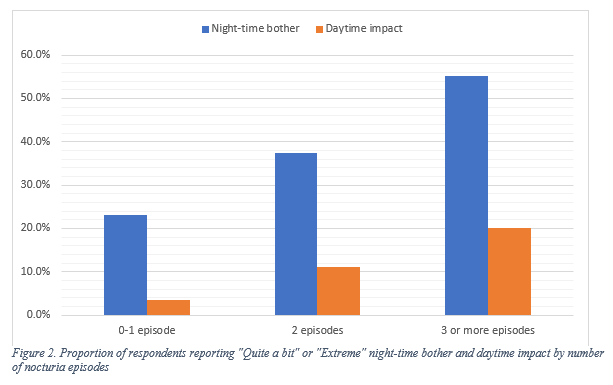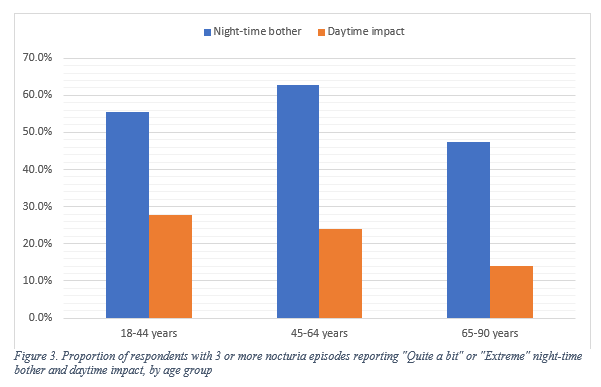
Learn the results of a study with wearable devices to explore nocturia — waking up at night to urinate—in the general population, conducted by Ferring Pharmaceuticals using data from Withings sleep tracking devices.
Nocturia — the medical term defining waking up at night to urinate — is not only bothersome but can have a real impact on your sleep. How much of an impact? Withings and Ferring Pharmaceuticals teamed up to find out more on this.
In this study, Ferring — a research-driven pharmaceutical company with a long history in the specialty area of urology — used data from Withings wearable devices to explore nocturia in the general population. Ferring used data collected from a group of 250,000 users of Withings wearable devices and survey responses from a subgroup thereof of 6,230 users. The goal was to examine the link between the number of night-time episodes of urination and the level of bother and sleep characteristics.
In February 2020, the research was published in The International Journal of Clinical Practice, a monthly peer-reviewed medical journal. Here are the sometimes-surprising results.
Nocturia affects both the young and the elderly in different proportions
Patients diagnosed with nocturia are mostly elderly, but so far, there has not been much information available on the impact of nocturia in people younger than 65 years old who are not diagnosed with nocturia.
In this study, in addition to gathering data from their wearable device, users of Withings wearable sleep trackers were asked to complete a questionnaire to understand the presence of nocturia and its associations with quality of life and sleep in a non-patient, working-age population. A total of 6,230 completed questionnaires were analysed; 42.9% of the respondents were aged 18-44 years, 44.8% were aged 45-64 years, and 12.3% were 65 years or older.
Analysis of the results showed that overall 14.2% of the respondents woke up at least 2 times per night to urinate. Six percent (6%) of respondents aged 18-44, 15.3% of those aged 45-64 and 38.9% of those aged 65 or more woke up at least twice per night to urinate.

More wake-ups equal more bother
We asked respondents how bothered they were when they awoke during the night to urinate. As expected, a higher number of night-time awakenings due to nocturia was associated with a higher level of bother: 55.3% of respondents with 3 or more nocturia episodes said they were “quite a bit” or “extremely” bothered, while only 23.2% of those with 0 or 1 nocturia episodes reported this level of bother. Daytime activities were affected too: 20.1% of respondents with 3 or more nocturia episodes reported being “quite a bit” or “extremely” affected in their activities on the following day.

Interestingly, the younger age groups were more bothered by nocturia, both at night and in their daytime activities, compared to older respondents.
Among those with 3 or more nocturia episodes, 55.6% of those aged 18-44 years and 62.7% of those aged 45-64 years reported a higher level of bother at night, compared to 47.4% of those 65-90 years old. Daytime activities were impacted too: of the respondents who reported 3 or more nocturia episodes, 27.8% of those aged 18-44 years and 24.1% of those aged 45-64 years reported their daytime activity being “quite a bit” or “extremely” affected, compared with 14.1% of those aged 65-90 years.

Waking up more times means you stay awake longer
Analysis of sleep data from the wearable device users showed that, on average, respondents with 3 or more nocturia episodes stay awake 20 minutes longer than respondents with 0 or 1 episodes, in other words, a higher number of awakenings is associated with a shorter total duration of sleep, and they have a lower sleep quality. In addition, the first uninterrupted sleep period was much longer — 243 minutes — in respondents with 0 or 1 nocturia episodes, compared to those with 3 or more episodes (124 minutes). The duration of the first uninterrupted sleep period is an important sleep quality indicator.
Summary of results
Nocturia doesn’t affect only elderly people, but is also present in a younger, working-age population. The level of bother during the night and the impact on daytime activities both increase with the number of nocturia episodes in all age groups. A higher number of awakenings was associated with a decreased total sleep time, and a lower sleep quality. Finally, younger respondents reported a higher level of night-time bother and daytime impact compared to older people with the same number of nocturia episodes.
The authors of this study would like to thank all participants who completed the survey; their contribution supports the advancement of our understanding of the use of wearable devices in research.
Study conducted by Chapple C, Bliwise D, Maislisch L, Roitmann E, Burtea T. Night-time voids, level of bother, and sleep characteristics in a non-patient population of wearable devices users. Int J Clin Pract 2020. Doi:10.1111/IJCP.13495 [Link]
GL-URO-2000022


